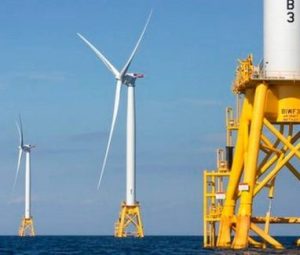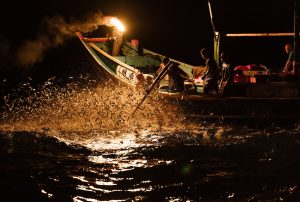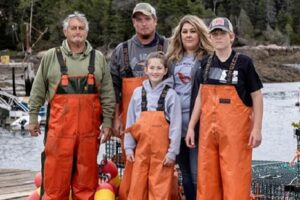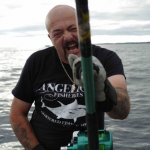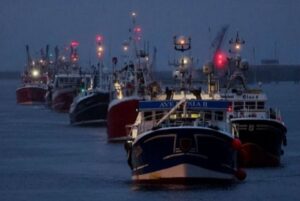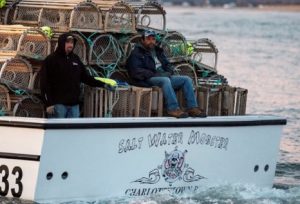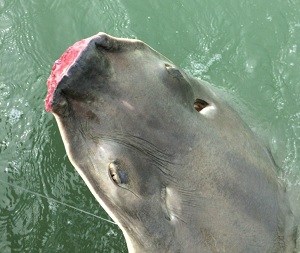Tag Archives: right whales

Maine DMR chief briefs Legislature on whales, bait
Department of Marine Resources Commissioner Patrick Keliher briefed the Legislature’s Marine Resources Committee on the latest news from the lobster bait and whale front. The news was not good. Speaking at a May 7 committee workshop, Keliher said the state was under severe pressure from NOAA Fisheries to find ways to reduce the number of vertical lines in the water that connect lobster traps to surface buoys. NOAA seeks a line reduction of more than 60 percent and wants it done soon. >click to read<11:21

DMF Rescinds Seasonal Large Whale Trap Gear Closure and Seasonal Speed Limit
Effective tomorrow, commercial and recreational lobstermen may set their trap gear in those waters north and east of Cape Cod that were previously closed to fixed gear. Additionally, boaters operating vessels that are smaller than 65’ over length may operate at a boat speed of greater than 10 knots. We advise that vessel operators continue to operate with caution. Through May 15th, vessels with an overall length of 65’ and greater shall comply with the federal 10 knot speed limit in the waters of Cape Cod Bay (federal rule). >click to read<20:31
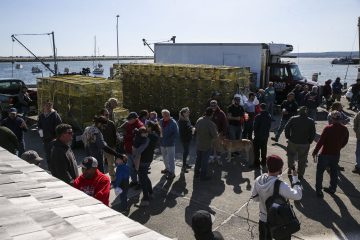
UPDATED: Lobstermen rally in Plymouth to protest closure of fishing areas off cape Cod
Local lobstermen rallied here Thursday morning to protest the state’s decision to keep certain areas closed to fishing to protect an endangered species of whale. State officials said the “continued presence” of right whales in the waters off Cape Cod resulted in the Division of Marine Fisheries extending the seasonal closure to May 14. “This closure extension applies only in certain waters within Cape Cod Bay and along the Outer Cape,” state officials said in the statement. >click to read<This story will be updated. 10:12 Lobstermen rally against delay in opening season – >Video, click to read< 11:16
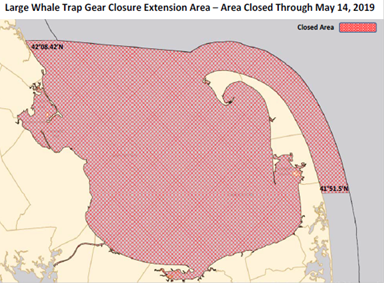
Division of Marine Fisheries – Seasonal Trap Gear Closure Extended Through May 14th
The continued presence of endangered right whales in the waters off Cape Cod results in the Director of the Division of Marine Fisheries extending the seasonal Large Whale Seasonal Trap Gear Closure through May 14, 2019 (Notice of Declaration)> click to read< This closure extension applies only in certain waters within Cape Cod Bay and along the Outer Cape. Calanus plankton counts indicate that the whales are likely to remain aggregated and feeding in the area.,,, This closure does not extend into any federal waters, including those waters north of Cape Cod on Stellwagen Bank. >click to read<16:03
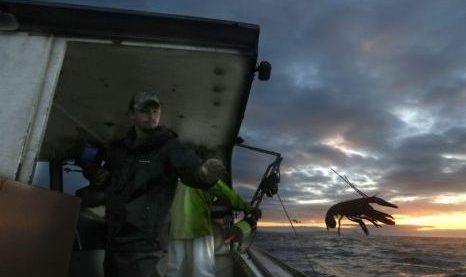
Maine Lobstermen Face 50 percent Trap-Rope Reduction To Protect Right Whales
Representatives from 14 Atlantic coast states participated in the four-day consensus-building project, including fishermen scientists, state regulators and conservation groups. The stakes were highest for Maine’s lobster industry, which landed $484 million worth of the crustaceans last year – the most valuable single-species fishery in the nation. The Cape Cod Times reports that Massachusetts and New Hampshire agreed to a 30% cut in the number of vertical lines, and to use ropes that break at a reduced weight. “The regulations proposed here today are a big ask,” says Patrick Keliher, the commissioner of Maine’s Department of Marine Resources. >click to read<13:06
NOAA – Team Reaches Nearly Unanimous Consensus on Right Whale Survival Measures ->click to read<15:50

Mass Div. Marine Fisheries Advisory: Seasonal Trap Gear Closure Extended Through May 8th
The continued presence of endangered right whales off Cape Cod results in the Director of the Division of Marine Fisheries extending the seasonal Large Whale Seasonal Trap Gear Closure through May 8th (Notice of Declaration) for certain waters within Cape Cod Bay and along the Outer Cape. This extended closure only applies within those waters under the jurisdiction of the Commonwealth within Cape Cod Bay south of 42° 8.42’ north latitude and east of Cape Cod north of 41° 51.5’ north latitude at Nauset Light (see map). >click to read<15:27
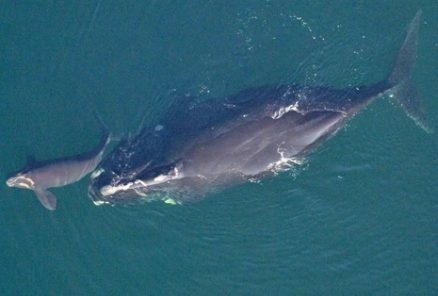
‘Lobster-Whale Work Group’ Faces Complicated Balancing Act As It Works To Protect Right Whales
Under pressure from lawsuits and the requirements of the federal Endangered Species Act, the federal government is closely reviewing the health of the right whale population, which is hovering around 410 animals. The result could be the imposition of new gear and other restrictions to reduce the risk of whale entanglement with the rope lobstermen use to position and haul their traps,,, a new “Lobster-Whale Work Group,” made up of state officials in the Atlantic States Marine Fisheries Commission, has proposed a slate of possible actions with the dual goals of protecting the whales and the “viability and culture of the lobster fishery.” “We’re doing everything we can to appease the people who think it may be us,” says Stephen Train, a lobsterman in Long Island, Maine. >click to read<11:50
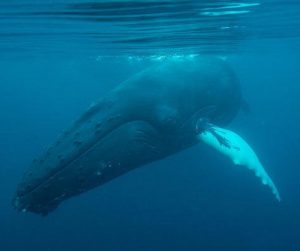
Whale entanglements exceeded average in 2017, report says
The number of large whales entangled in U.S. waters was a little worse than usual in 2017, but entanglements of right whales and in the Northeast were down. In a report released Thursday, the National Oceanic and Atmospheric Administration confirmed 76 large whales were found entangled in fishing gear or marine debris in U.S. waters in 2017. Six of the 76 entangled whales were found dead, 45 were presumed to be alive but still entangled, four had freed themselves and 21 were freed by good samaritans or members of the national Large Whale Entanglement Response Network. >click to read<14:35
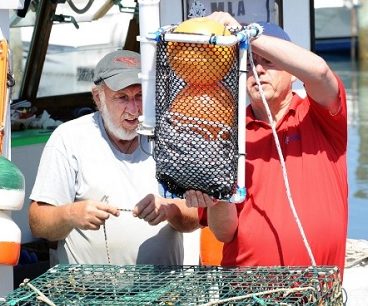
Ropes are latest flashpoint in tug of war over right whales
The lobster industry is willing to consider switching to weaker rope to protect the endangered right whale from deadly entanglements, but whale defenders say that doesn’t go far enough to help a species that can’t bear even one more death. A team of scientists, regulators, animal rights groups and fishermen met this week in Providence to review proposals,,, The team is advising the National Marine Fisheries Service on how to prevent whales from getting entangled in fishing gear as they migrate, feed and mate as they travel back and forth along the East Coast of the United States and Canada. >click to read<11:54

Regulators meet next week to consider actions to save right whales which could drastically change lobstering
Proposals to close the fishery in the western Gulf of Maine south of Cape Elizabeth during April, cut the number of seabed-to-surface lines that can entangle whales, and become a ropeless fishery by 2020 are among the ideas to be discussed next week in Providence, Rhode Island, by the team of scientists, fishing groups and animal rights activists tasked with saving the right whale from extinction.,,, In their proposal, The Humane Society of the United States, Defenders of Wildlife and Center for Biological Diversity – which together sued the federal government for not doing more to protect whales from lobster gear – outline a fast-moving plan to transition to a ropeless fishery, requiring all new entrants to the federal fishery be rope-free by Jan. 1, and that all participants in any Atlantic trap or pot fishery, including Maine’s, use only ropeless gear by Jan. 1, 2020. >click to read<09:03
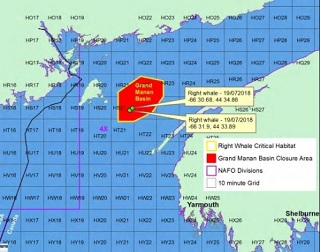
Bay of Fundy: Right whales trigger fishing area closure, gear must be removed from Grand Manan Basin by 6 p.m. Sunday
The Department of Fisheries and Oceans has announced more fishing closures in the Atlantic region due to the presence of right whales. DFO said two right whales were spotted in the Grand Manan Basin — critical habitat area in the Bay of Fundy. The area will be closed to fishing beginning Sunday at 6 p.m. until further notice. All gear must be removed from the closed area before that time. The fisheries affected include groundfish species, herring, mackerel and lobster, DFO said. >click to read<15:05
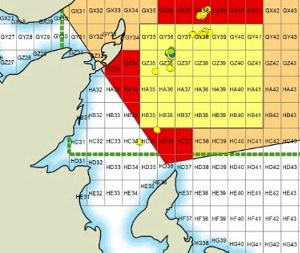
DFO closes more fishing zones after right whale sighting
The Department of Fisheries and Oceans has closed portions of four fishery grids after right whales were spotted in the area. The affected grids are in the extreme south of the speed reduction zone and will begin at 10 a.m. on Friday. The closure marks the 20th fishery closure this year related to the North Atlantic right whale. No right whales have been found dead in Canadian waters since last year but a right whale was spotted last week off Miscou Island partially entangled. It has not been spotted since. >click to read<18:33

Notice of fisheries closures – Fishermen told to remove gear from gulf areas to protect right whales
Fishermen have until Wednesday to get their gear out of the water in five newly closed fishing zones of the Gulf of St. Lawrence. The Department of Fisheries and Oceans has gotten reports of North Atlantic Right Whales in the area prompting the closure of more fishing zones. DFO said crews must remove their gear by 5 p.m. AT on Wednesday, June 6. The next 24 hours will bring high winds, so DFO is allowing a longer notice than usual. “All gear must be removed from the closed area before the time of closure,”>click to read<DFO notice>click here<08:04
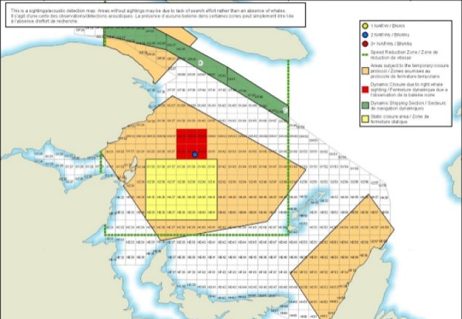
Gulf of St. Lawrence – 6 fishing areas closing after 2 right whales spotted
The Department of Fisheries and Oceans is temporarily closing several fishing areas in an effort to protect endangered right whales. In a tweet, Fisheries Minister Dominic LeBlanc said two North Atlantic right whales were spotted in the Gulf of St. Lawrence off the coast of New Brunswick. The closures will take effect May 22 at 4 p.m. and all gear is expected to be removed from the water by that time. The closures are for the following fisheries: snow crab, toad crab, rock crab, lobster and whelk. The closures will also apply to winter flounder and Atlantic halibut, except where gear is not left unattended. >click to read<07:25

Injunction sought against lobster buoy lines
On Friday, Richard Maximus Strahan filed the emergency motion in U.S. District Court for a temporary restraining order to stop either the licensing or deploying of vertical bouy lines, arguing they routinely entangle the endangered whales, causing serious injury and death. The restraining order should be in effect until marine fisheries officials and the Massachusetts Lobstermen’s Association could show there are no more right whales, a migratory species, in the states coastal waters, according to the motion. >click to read< 08:58
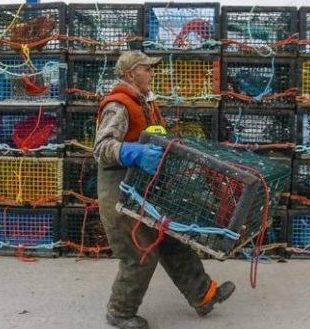
Right whale rules trap fishermen
The federal government’s decision to extend rules protecting right whales to P.E.I.’s lobster fishermen sent waves of anxiety through the industry last week. The fishermen were reacting not only to the poor timing of the decision — coming just days before the lobster season’s opening on May 1 — but, more urgently, the prospect that their livelihood may dwindle if a right whale is spotted near a fishing vessel. Of course, the reasoning for these federal measures isn’t really at issue — no one is saying right whales shouldn’t be protected. >click to read<09:53
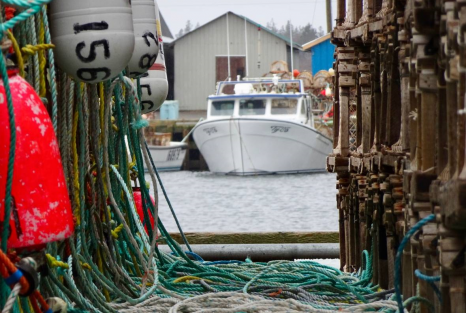
Setting Day: ‘One of my busiest days, stressful days, my exciting days of the year,’ says 22-year fishing veteran
Lobster fishermen at many Prince Edward Island harbours were busy getting their boats, traps and crew ready for the start of the spring season Monday. The tradition of the 6 a.m. start and the busy day of getting all the traps in the water for the first time each year is known as setting day. At Malpeque Harbour, on the northern part of the Island, it was a hive of activity Sunday as fishermen worked to get ready. >click to read<18:44
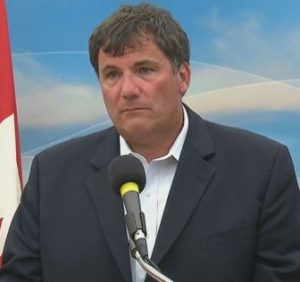
Fisheries minister meets with lobster industry today about disputed closures
Federal Fisheries and Oceans Minister Dominic LeBlanc is in Moncton on Friday to meet with the lobster industry, after new rules introduced this week to protect endangered whales left fishermen in a state of shock and frustration.,, He suggested the measures were necessary to avoid a punitive response from the U.S. and to protect the lobster industry. “Under American law, if a country does not take every reasonable and possible step to protect these highly endangered marine mammals, the American government can decide, under the Marine Mammal Protection Act of the United States, that the remedy is to close the American border to imports of fish and seafood from that country, which would have a devastating effect.”>click to read<12:10
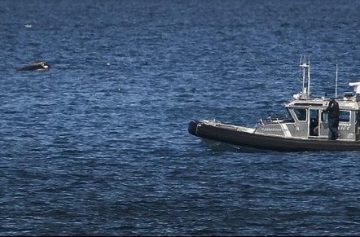
State regulators: Lobster season will have to wait – a sudden influx of right whales
Lobstermen already have to observe a three month closure from Feb. 1 to April 30 annually in an effort to reduce the number of whales that get entangled in fishing gear during their annual migration. Now, however, boats won’t be able to hit the water until May 6 at the earliest, and a second regulation imposes a 10 knot speed limit for vessels less than 65 feet long through May 15. Right whales feed close to the surface and are vulnerable to vessel strikes. “There are a number of challenges in this industry, and one of those is being able to fund your livelihood for 12 months when you can only fish for nine months,” John Haviland, president of the South Shore Lobster Fishermen’s Association, said. >click to read<17:34
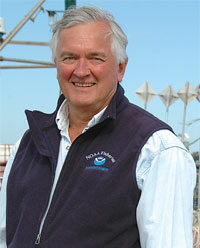
John Bullard: Lobster industry must lead on right whales
A NUMBER OF EVENTS over the past two weeks have probably gotten the full attention of the US lobster industry and increased pressure for it to take the lead in fighting the potential extinction of the North Atlantic right whale. In response to the deaths of the endangered whale, including 12 in Canada last year, Canada has imposed new restrictions on ship speeds and snow crab fishing, as well as earmarked $1 million more annually to help free marine mammals from fishing gear. >click to read<12:03
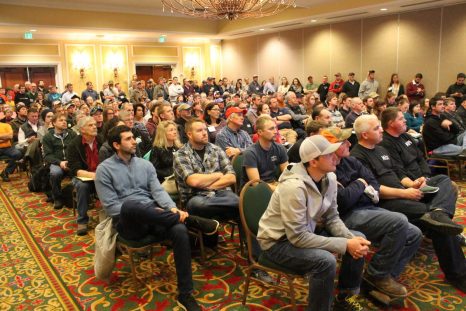
Lobstermen pack meeting concerning right whales, possible gear changes at the Maine Fishermen’s Forum
Lobstermen from all over the state packed the Rockport Room at the Samoset Resort to overflowing Friday to hear about the potential for ropeless fishing and use of break-away lines to help save the endangered right whale. The panel discussion March 2 at the annual Maine Fishermen’s Forum brought fishermen together with several experts including scientist Mark Baumgartner of Woods Hole Oceanographic Institute, Amy Knowlton of the New England Aquarium and Mike Asaro of NOAA Fisheries. >click to read< 10:06
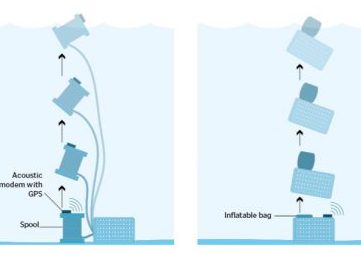
To protect right whales, scientists propose major changes for lobstermen
Without prompt action to reduce entanglements in fishing lines, North Atlantic right whales could disappear from the planet over the next two decades, scientists say. In response, scientists here on Cape Cod are proposing a novel way to save the species — one that many New England lobstermen fear could destroy their livelihoods.,,, In one method, the signal would inflate a spool filled with rope that ascends to the surface, allowing the lobstermen to haul their traps similarly to how they do now. In the other, the signal would activate inflatable bags attached to each trap or at the end of the trawls. >click to read< 08:45

Canada to introduce mandatory reporting of whale interactions this year
“Save the Whales” will take on new importance for Canadian fishermen in 2018 as the Department of Fisheries and Oceans introduces mandatory reporting for interactions Canada’s commercial fishing fleets have with marine mammals. The deaths of a dozen critically endangered right whales in the Gulf of St. Lawrence last year is the driving force behind the effort, which has already resulted in changes in the Gulf of St. Lawrence snow crab fishery, whose gear has been implicated in some of the deaths. >click to read<08:18

Conservation Law Foundation files Lawsuit to protect right whales
After a year of major losses for North Atlantic right whales, a local environmental advocacy group filed a federal lawsuit against the National Marine Fisheries Service Thursday, arguing that the agency should do more to protect the critically endangered mammals. But lawyers at the Conservation Law Foundation in Boston, which filed the suit, argued that the agency should be doing more. “Regulators are not just morally mandated to act . . . they are also legally required to ensure fishing efforts do not cause harm to these animals,” said Emily Green, an attorney at the foundation. >click to read< 20:47
Federal fisheries minister called meeting with experts in Moncton to find way to protect right whales
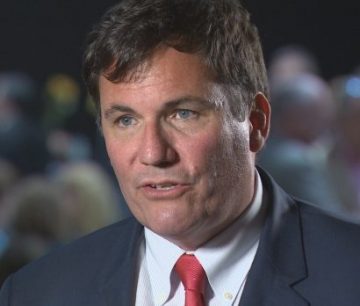 The federal government will consider using the $400 million Atlantic Fisheries Fund and an innovation prize to develop new fishing gear or technology to help protect North Atlantic right whales in the Gulf of St. Lawrence.,,, LeBlanc is discussing solutions with representatives from the fishing and marine transport industries, First Nations leaders from Eastern Canada, scientists and other officials.,,, LeBlanc said some options that could be considered include a reduction or modification of fishing gear, reducing the number of fishing boats on the water and starting the fishing season earlier. click here to read the story 15:48
The federal government will consider using the $400 million Atlantic Fisheries Fund and an innovation prize to develop new fishing gear or technology to help protect North Atlantic right whales in the Gulf of St. Lawrence.,,, LeBlanc is discussing solutions with representatives from the fishing and marine transport industries, First Nations leaders from Eastern Canada, scientists and other officials.,,, LeBlanc said some options that could be considered include a reduction or modification of fishing gear, reducing the number of fishing boats on the water and starting the fishing season earlier. click here to read the story 15:48
Ottawa to order ships to give right whales a 100-metre buffer zone in Gulf – click here to read the story
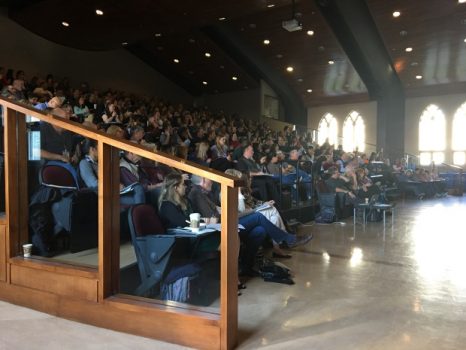
North Atlantic Right Whale Consortium – scientists say Right whales could be 20 years away from certain extinction
Scientists at an annual meeting for North Atlantic right whales estimate the species has a little over two decades left to survive unless changes are made immediately. The North Atlantic Right Whale Consortium’s annual meeting was held in Halifax on Sunday, and all of the scientists spoke with a sense of urgency about the fate of these whales. This summer, at least 15 right whales died in Canadian and U.S. waters and scientists at the conference stressed that human activity is the primary cause of death for all right whales. click here to read the story 11:21
New measures coming to protect right whales in Gulf of St. Lawrence: LeBlanc
 As Canadian officials scramble to determine whether an endangered whale caught in fishing rope off Quebec’s Gaspe Peninsula may have freed itself, federal Fisheries and Oceans Minister Dominic LeBlanc is promising a new set of rules around commercial fishing gear to protect the large marine mammals. A North Atlantic right whale was spotted entangled in ropes during a fly-over of the Gulf of St. Lawrence Monday, but LeBlanc said aerial and water patrols were unable to locate it Tuesday. LeBlanc said the federal government will usher in a new set of rules around fishing gear to improve the safety of whale migration in the Gulf of St. Lawrence. click here to read the story 13:37
As Canadian officials scramble to determine whether an endangered whale caught in fishing rope off Quebec’s Gaspe Peninsula may have freed itself, federal Fisheries and Oceans Minister Dominic LeBlanc is promising a new set of rules around commercial fishing gear to protect the large marine mammals. A North Atlantic right whale was spotted entangled in ropes during a fly-over of the Gulf of St. Lawrence Monday, but LeBlanc said aerial and water patrols were unable to locate it Tuesday. LeBlanc said the federal government will usher in a new set of rules around fishing gear to improve the safety of whale migration in the Gulf of St. Lawrence. click here to read the story 13:37
All options to protect right whales ‘on the table,’ says Fisheries Minister Dominic LeBlanc
 The federal government will bring “absolutely every protection possible to bear” to prevent any further deaths of North Atlantic right whales in the Gulf of St. Lawrence, federal Fisheries Minister Dominic LeBlanc pledged on Thursday. His department is working closely with Transport Canada to address the “serious and troubling situation” and will provide whatever resources are necessary to protect the endangered species as well as the people who work near the whales, he said during a news conference in Moncton. The government is prepared to “take all necessary steps.” “Every option to protect right whales is on the table,” he said, citing changes to shipping lanes, surveillance flights or changes to fishing gear as being among the possibilities. click here to read the story 12:53
The federal government will bring “absolutely every protection possible to bear” to prevent any further deaths of North Atlantic right whales in the Gulf of St. Lawrence, federal Fisheries Minister Dominic LeBlanc pledged on Thursday. His department is working closely with Transport Canada to address the “serious and troubling situation” and will provide whatever resources are necessary to protect the endangered species as well as the people who work near the whales, he said during a news conference in Moncton. The government is prepared to “take all necessary steps.” “Every option to protect right whales is on the table,” he said, citing changes to shipping lanes, surveillance flights or changes to fishing gear as being among the possibilities. click here to read the story 12:53
LeBlanc vows to save ‘majestic’ whales after deadly summer – click here to read the story 15:20
Trap Gear Closure Lifted; Right Whales Leaving Cape Cod Bay
 The trap closure extension in Cape Cod Bay has been lifted effective Friday May 5 because nearly all the whales that were aggregated in Cape Cod Bay have departed as expected. DMF filed emergency regulations last week to extend the prohibition of trap gear within certain waters of Cape Cod Bay. This closure extension was enacted because in mid-April there was an unprecedented aggregation of over 200 right whales feeding on dense plankton, and more than 100 remained just days before the scheduled May 1 opening. Feeding right whales are susceptible to entanglement in vertical buoy lines. click here to read the notice 22:55
The trap closure extension in Cape Cod Bay has been lifted effective Friday May 5 because nearly all the whales that were aggregated in Cape Cod Bay have departed as expected. DMF filed emergency regulations last week to extend the prohibition of trap gear within certain waters of Cape Cod Bay. This closure extension was enacted because in mid-April there was an unprecedented aggregation of over 200 right whales feeding on dense plankton, and more than 100 remained just days before the scheduled May 1 opening. Feeding right whales are susceptible to entanglement in vertical buoy lines. click here to read the notice 22:55






